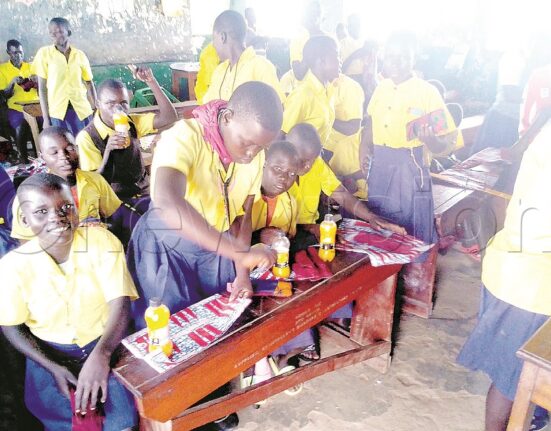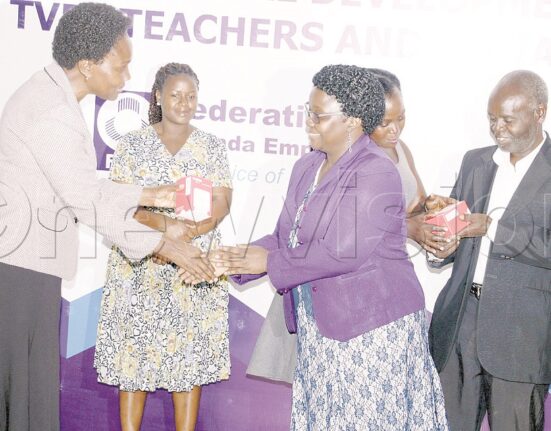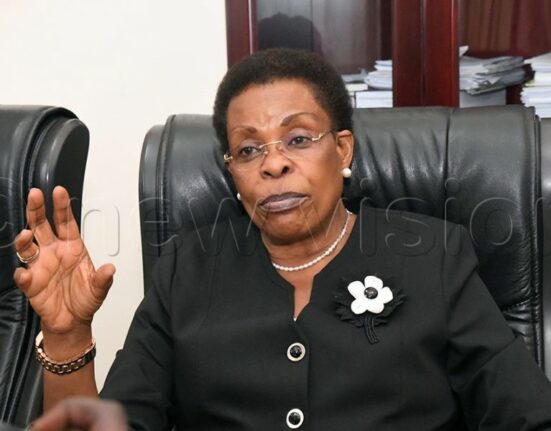A Multi-Skilled Labour Force Can Achieve Vision 2040

With the reopening of education institutions, secondary school students are being introduced to a competence-based curriculum. Mwalimu is exploring various aspects of the competence-based curriculum. In the fifth article in the series, George Bita, explores how the Government plans to secure students’ competence skills
With learners taking centre-stage, the new competence-based curriculum is expected to produce a skilled ‘graduate’ out of secondary schools.
David Eliachu, the principal of Iganga Technical Institute in Iganga district, argues that the emphasis on competence-based curriculum is a step in the right direction in addressing youth unemployment nationwide.
“This goes hand-in-hand with the national vision of transforming Uganda from a peasantry-based society into an upper middle-income by 2040. This can be achievable with a multi-skilled labour force being targeted in the new setting,” Eliachu assures.
The competence-based curriculum is being supported by the Technical Vocational Education and Training (TVET), which has been revamped to increase its appeal for learners and their parents.
The Business, Technical Vocational Education and Training (BTVET) policy was drafted with a focus on employable skills and competencies on demand for local and international job markets.
A Ministry of Education and Sports survey done in conjunction with BTVET indicates that 70% of employers cherish the competencies of skilled graduates.
An estimated 80% of BTVET graduates got profitable employment by 2020, breaking the age-old culture of seeking white-collar jobs.
EQUIPMENT EMPOWERMENT
On January 26, the government delivered sh11b (US$3m) worth of training equipment to Uganda Technical College, Bushenyi.
The tools are part of a sh30b package the education ministry recently contracted to three companies for delivery to 12 newly refurbished technical colleges.
Alex Kakooza, the education ministry permanent secretary, signed the contracts in August 2020 with representatives from Eagles Scientific Ltd, Delorenzo SPA and Venefir SRL.
Kakooza explains that Delorenzo SPA has not only been contracted to deliver the equipment to Bushenyi, but also install, train users and commission the technical education workshop equipment.
He adds that the consignment, including welding and fabrication tools plus many others, are part of a World Bank-funded Uganda Skills Development Project (USDP).
“We are working towards making vocational institutions the first choice for parents and learners. This is achievable through ongoing rebranding of technical and vocational education,” Kakooza asserts.
He also cites the Presidential Inititive on Skilling the Girl Child of 2017 that has churned out over 80,000 girls equipped with hands-on skills plus start-up capital for equipment. The beneficiaries engage in tailoring, bakery, hairdressing and shoe making so as to improve their incomes.
Admission Adjustments
Kakaire Magoola, the in-charge of admissions at Iganga Technical Institute, notes that the admissions have been turned into regional joint processes at designated centres.
“The current TVET arrangement is to use Lira for northern Uganda admissions, Madera (Soroti) for eastern and Nyamitanga for the southwestern region. Others are Kichwamba for western and Ntinda Vocational for the central region,” Magoola says.
He reveals that unlike in the past, the most recent selection exercise was conducted with the guidance of the education ministry.
“Students with prior skills-based knowledge scored higher with comparatively high chances of admission. The girls had two points added to them under affirmative action,” Magoola says.
We admitted 390, but so far, 200 have reported for studies. The term has just started and we hope the rest will show up soon,” Magoola notes.

Training Takes Off
Stella Akiteng, an instructor at Uganda College of Commerce (UCC) Tororo, appreciates the move by the ministry to train staff from institutes across the country.
“We hope the sessions will be more regular to ensure that staff is kept abreast with the current global technological advancements. It is the best way to effectively skill our learners in order to make them competitive at the international level,” Akiteng says.
Eric Magoba, an instructor at Bukedea Technical Institute in Bukedea district, appreciates the donation of equipment from the ministry.
Magoba argues that the ministry should provide equipment in its totality to facilitate effective learning.
“It the agriculture department, we lack farm animals to use with the machinery delivered. So, we cannot use the expensive machines due to lack of specimen,” he laments.
Eliachu explains that each of the participatory institutes presented two trainees for a one-week workshop.
Magoola notes that although the Government re-equipped most institutes, COVID-19 and related social distancing makes the new equipment insufficient for the learners.
Ketty Lamaro, the education ministry permanent secretary, reveals that there are also advanced level TVET scholarships at masters degree and doctorate level.
“The Government has secured long-term loan financing from the Islamic Development Bank towards the BTVET support project. The undertaking has a number of scholarship opportunities at master’s and doctorate levels,” she says.
She identifies fields involved as TVET, construction, manufacturing, agriculture and mining value chains, mining value chain plus tourism and hospitality.
“The scholarships are to be conducted at Competence-Based Education and Training (CBET) oriented international specialised training institutions of English language instruction. The courses kick off in the 2022/23 academic year,” Lamaro clarifies.
She says the beneficiaries, picked through a four-stage competitive process, will be awarded scholarships that cover cost of return air ticket, tuition fees, research and agreed expenses.
Lamaro says in line with the growing Uganda’s capacity for advanced research to support the ongoing BTVET reform process, scholarship awardees must commit themselves to return.
“Those on master’s programme should be ready to return home and serve a minimum of five years after completion of the course. For doctorates, they must work for three years in the TVET sub-sector of Uganda,” she says.
TVET Policy
David Mubiru, a principal TVET officer and national co-ordinator of training, explains that the TVET policy hinges on government strategic plan of skilling Uganda.
“This would not be possible without having a competence-based From page 17 curriculum in place. Learners can now polish up their skills with the necessary tools provided by instructors at institutes countrywide,” Mubiru says.
Lamaro discloses that the quality of TVET graduates depends on relevance of the curricula and competence of the trainers.
“The TVET policy 2019 has emphasised three major areas; flexibility plus relevance of TVET, linking training and assessment with the practicability of working environment and fronting industrial capabilities. I am impressed UBTEB is already compliant,” she says.
She adds that towards this skilling objective, the ministry has created departments specifically for TVET.
“The ministry is reforming TVET delivery with one assessment board for all-level TVET training, ranging from non-formal, informal and formal training. Government is doing this via policy, legal and regulatory reforms. After enactment of laws, TVET delivery in Uganda will have been streamlined,” she says.
Lamaro notes that government has already offered mandatory start-up funds and land for the construction of the UBTEB assessment centre.
SUPPORT SUPERVISION
According to Mubiru, the supervisory role is a sure way of increasing the quality of skills provision countrywide.
“There are gaps in training. We also have under-utilisation of training materials, which can be addressed with supervision,” he says.
Mubiru says problems with inventory management can be solved with rigorous supervision of the 56 refurbished technical institutes across the country.
“Just 56 out of the 146 technical institutes were revamped and given new equipment. In the meantime, we should have a maintenance plan for the expensive equipment,” he says.
Mubiru argues that support supervision will enable stkeholders to assess whether the partner TVET institution is conforming to the council guidance as per the institutional guidelines.
Lamaro also notes that the ministry will not stop at training, but will also carry our follow-up supervision to ensure that the institutes are conforming to guidelines laid out in the TVET policy.
NEW VISION SUPPORT
Weekly publications
To support the implementation of the competence-based curriculum, the New Vision is publishing related lesson materials. The lessons are targeting students in Senior One and Senior Two and are published from Monday to Saturday. The eight core subjects that New Vision is publishing include mathematics, English, physics, chemistry, biology, Kiswahili, geography and entrepreneurship.
The competence-based curriculum seeks to ensure that teachers and learners relate textbook knowledge to real life. Therefore, the lessons involve several activities in various subjects for the learners to perform, relate to their communities and solve problems, instead of memorising teachers’ notes.
Textbooks
Working with a team of expert teachers, Vision Group has also published textbooks highly ranked by the Ministry of Education and Sports for the new competence-based curriculum and these will be at all our sales outlets by the end of this month.
To book newspapers and textbooks, WhatsApp: 0772472187
What Others Say

Brenda Nakato, instructor from Jinja Vocational Training Institute
In order for the skilling programme to succeed, there is need for regular refresher trainings organised by government. Instructors trained at different times and need to be helped to get fresh knowledge.

Phillip Nguwa, instructor at Mbale Polytechnic Institute
We are encouraged to use ICT, but computers are few in most institutes. Government should endeavour to avail institutes with more such gadgets

Teddy Babirye, head of machining and fitting department at Iganga Technical Institute
We thank the Government and partners from South Korea, who enabled us to get modern equipment. Unfortunately, the student numbers are high, which compromises effective usage of resources.








Leave feedback about this